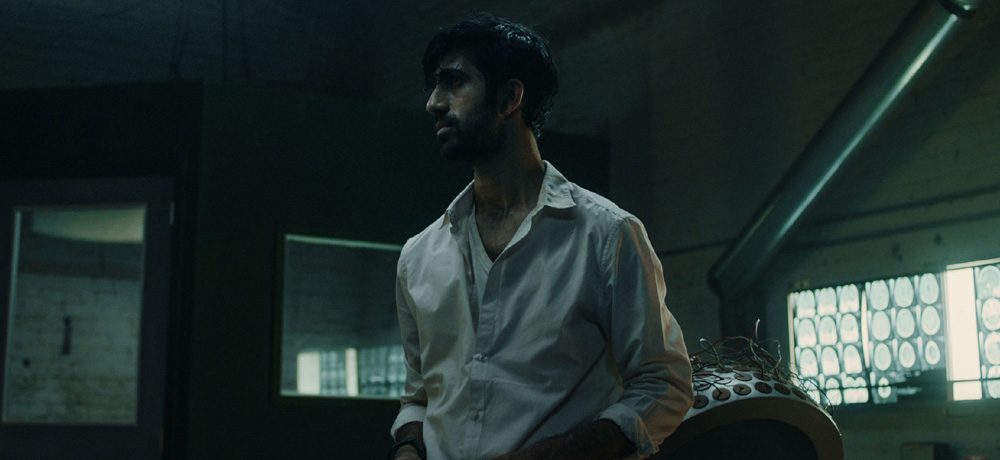


With the 2020 Fantasia Film Festival wrapping up this week, here’s a look at the final three films this writer had the opportunity to screen during the virtual fest (and enjoyed immensely), including Natasha Kermani’s Lucky, Dinner in America from writer/director Adam Rehmeier, and Minor Premise, which was co-written and directed by Eric Schultz.

Lucky: If Natasha Kermani had been contemplating other titles for her latest film project, Gaslighting: The Movie would have been a wholly appropriate, albeit a very on-the-nose, choice as well. But Lucky works pretty damn well, too, as it is in reference to a moment in the film when the main character, May, is informed by her manager/agent that she should consider herself “lucky” after a professional opportunity works out to her advantage, instead of congratulating her for all of her hard work. Truth be told, that’s the moment Lucky totally clicked for me, as I have a bad habit of always trying to discount my own work by saying I’ve been lucky (and I have been, but luck is only part of it), rather than focus on how I consistently work hard in this field.
But enough about me, let’s get back to Lucky. As mentioned, the film is centered around May Ryer (played by Brea Grant, who also wrote the script), an author who is having a bad run of luck: her marriage is on rocky footing, she’s having trouble getting things together for her next book project, a strange man keeps breaking into her home every night hoping to kill her, and no one seems to believe her. It feels like the authorities and everyone May tells about this strange man and what’s been happening to her basically are doing their best to placate her after every attack, but the writer decides to take matters into her own hands, determined to figure out just why this guy is hellbent on killing her and the reason he keeps reappearing in her life for days on end.
There are aspects of Lucky that are completely frustrating, but I mean that as a compliment, as Grant’s script does a brilliant job of making May’s frustrating situation completely relatable even if you’re not someone who has been relentlessly stalked or assaulted. Beyond all the physical harm she’s endured, May’s mental state begins to slowly deteriorate along with her resolve, as there doesn’t seem to be a way to stop what’s happening to her. Regardless of how hard she fights, the man keeps coming back, and there’s definitely a connection there between what May is experiencing in Lucky and what nearly all women endure every single day of their lives.
We often feel unsafe doing the most innocuous of tasks, we deal with harassment, people discounting our opinions due to our gender, or those in authority being completely dismissive of our concerns. And Grant does a beautiful job of encapsulating all of those complicated experiences in her performance here, as her portrayal of May is runs the gamut of being brazenly assured and completely broken in equal measure.
Without a doubt, Lucky is sure to ruffle a few feathers, but Kermani does a brilliant job here of unapologetically capturing the female experience, and she proves that between her latest and Imitation Girl, her ability to explore various aspects of feminine identity under the modern lens of filmmaking is a truly remarkable breath of fresh air. Also, Kermani’s reliance on a blue-tinged palette throughout Lucky, which is a color that’s meant to bring peace and calm, was a fantastic touch, as it did a great job of acting as a juxtaposition against the tension and anxiety of May’s ordeal throughout the film.
Movie Score: 4/5

Dinner in America: I somehow missed Dinner in America when it played during the Sundance Film Festival earlier this year, so I wanted to make sure I caught up with it during Fantasia. And holy hell, it did not disappoint. Dinner in America is certainly an abrasive dark comedy with pure anarchy coursing through its veins, but at its core, it’s also a sweet and oddly charming story of two misunderstood outcasts finding a kindred spirit in each other, and I was easily charmed by the performances from both Kyle Gallner and Emily Skeggs.
The film introduces us to a punk rocker Simon (Gallner) who clearly has a people problem; the problem being that he cannot stand other human beings, which is something I kind of relate to these days. But Simon finds himself on the run after committing an act of arson, and while hiding out after being made by a patrol car, he crosses paths with Patty (Skeggs) who is hanging out in an alley behind the pet store she works at. The quirky young woman decides to take Simon home with her to help him evade authorities, and her conservative parents (played by Mary Lynn Rajskub and Pat Healy) decide to let him stay with their family after he lays some sob story on them about him having nowhere to go. Both Simon and Patty get to know each other, and Gallner’s character initially freaks out when he realizes that his new friend also happens to be his biggest fan. But from there, an unlikely romance blossoms between them that will change the trajectory of the lives of both Patty and Simon in ways they could have never imagined.
Truth be told, I have been avoiding the filmmaking output of Adam Rehmeier ever since I sat through The Bunny Game in 2010, which was an experience that redefined cinematic nihilism in ways that I can still feel deep in my bones (I guess if nothing else, the film was effective then). But watching that movie was an absolutely miserable experience for me, and I was hopeful going into Dinner in America (after hearing some solid things about it post-Sundance) that he had evolved as a visual storyteller, and I feel like he definitely has. Dinner in America still has its rough edges, where I feel like it relies far too much on some offensive dialogue that I don’t know that the film really needs to get its point across or telegraph its angst either.
But Gallner and Skeggs both make it easy to overlook Dinner in America’s questionable vernacular though (also, I suspect the film takes place in a different era than we’re in now, which doesn’t necessarily excuse such language, but it would give such words a bit of context since society hadn’t quite evolved past them yet), and the more time we spend with this pair of misfits, the easier it is to want to root for them throughout the film. They really are the heart of Dinner in America and while watching Skeggs here was a revelatory experience for me (I hadn’t crossed paths with her work previous to this), I do feel like Gallner’s work in Dinner in America might just be his best role to date.
I could definitely see how some viewers might find Dinner in America a bit “much,” as it is the perfect embodiment of confrontational cinema that isn’t going to work for everyone. But for me, the film’s underlying sense of apathy mixed with a pitch black sense of humor was something that very much spoke to me, especially these days, and I really dug its incendiary takedown of certain subcultures and how it evolved into a rather adorable love story that also celebrated not apologizing for who you are as well.
Movie Score: 4/5

Minor Premise: As a fan of heady sci-fi stories, I really had a great time with Minor Premise, from co-writer/director Eric Schultz, who ambitiously swings for the fences with his intimately crafted story of one man’s journey toward finding himself that comes about through his own pursuit of higher knowledge, blending together theories and ideas from philosophy and neuroscience as well as human psychology. There’s a lot to digest in Minor Premise, and I’m still not sure I was able to totally wrap my brain around everything the script digs into, but the way it all comes together in the end is nothing short of a storytelling miracle, and it’s definitely a film I could see myself revisiting again in the future.
Minor Premise follows a neuroscientist named Ethan Kochar (Sathya Sridharan) whose life has been overtaken by his work, which has caused him to essentially shut himself away from the rest of society. The project that has consumed his life is a machine that will make it possible for those who utilize it to control their subconscious mind. Ethan’s father, who passed away, was in a similar line of work, which is another added pressure Ethan that is dealing with, as he looks to find a way to advance the research his dad was doing. But after one of his experimental sessions goes awry, Ethan finds himself dealing with 10 separate fragmentations of his conscious state, and the clock is continually ticking as he tries to deal with the ups and downs of these various iterations of himself, and trying to find a way to bring those fragments all back together in the end.
As mentioned, there’s a whole lot of science that gets bandied about in Minor Premise, and I think for the most part, I was able to follow along with the general gist of the story and the concepts presented here. To me, it was a similar experience to watching something like Prince of Darkness for the first time, where I feel like the ideas presented here by co-writers Thomas Torrey, Justin Moretto and Schultz will reward upon multiple viewings. Beyond all the science, Minor Premise is also a fascinating character study of one man’s desperate pursuit of knowledge that pushes him to the brink, and how the power of human connection saves him in the end (it’s like the reverse of David Cronenberg’s The Fly).
That human connection comes in the form of Alli (played by Paton Ashbrook), Ethan’s former girlfriend and colleague who refuses to give up on him, and helps him work through the process of trying to put his psyche back together in the end. Both Sridharan and Ashbrook are excellent in Minor Premise, as their engaging characters drive the narrative here in some rather unique ways, and I really enjoyed the latter half of the movie when it was focused on that back-and-forth shared between Ethan and Alli.
That’s when it really feels like Minor Premise hits its stride and I was totally enthralled watching them try and put together the pieces of the puzzle and work towards a resolution alongside each other. For his feature film debut, Schultz has constructed a stunning slice of sci-fi cinema that really left me thinking in a variety of ways, and I think Minor Premise demonstrates an adept ability to marry smart, intellectually-driven storytelling that also has a bit of an emotional wallop to it as well.
Movie Score: 4/5